10 start with Y start with Y
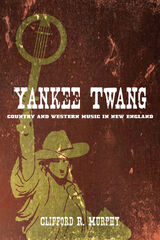
As Murphy shows, an extraordinary multiculturalism sets New England country and western music apart from other regional and national forms. Once segregated at work and worship, members of different ethnic groups used the country and western popularized on the radio and by barnstorming artists to come together at social events, united by a love of the music. Musicians, meanwhile, drew from the wide variety of ethnic musical traditions to create the New England style.
But the music also gave--and gives--voice to working-class feeling. Murphy explores how the Yankee love of country and western emphasizes the western, reflecting the longing of many blue collar workers for the mythical cowboy's life of rugged but fulfilling individualism. Indeed, many New Englanders use country and western to comment on economic disenfranchisement and express their resentment of a mass media, government, and Nashville music establishment that they believe neither reflects their experiences nor considers them equal participants in American life.

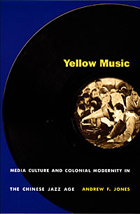
The personal and professional histories of three musicians are central to Jones's discussions of shifting gender roles, class inequality, the politics of national salvation, and emerging media technologies: the American jazz musician Buck Clayton; Li Jinhui, the creator of "yellow music"; and leftist Nie Er, a former student of Li’s whose musical idiom grew out of virulent opposition to this Sinified jazz. As he analyzes global media cultures in the postcolonial world, Jones avoids the parochialism of media studies in the West. He teaches us to hear not only the American influence on Chinese popular music but the Chinese influence on American music as well; in so doing, he illuminates the ways in which both cultures were implicated in the unfolding of colonial modernity in the twentieth century.
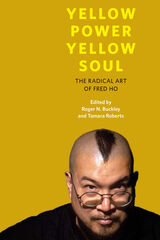
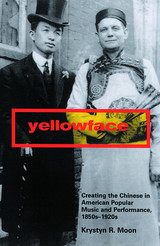
Music and performance provide a unique window into the ways that cultural information is circulated and perceptions are constructed. Because they both require listening, are inherently ephemeral, and most often involve collaboration between disparate groups, they inform cultural perceptions differently from literary or visual art forms, which tend to be more tangible and stable.
In Yellowface, Krystyn R. Moon explores the contributions of writers, performers, producers, and consumers in order to demonstrate how popular music and performance has played an important role in constructing Chinese and Chinese American stereotypes. The book brings to life the rich musical period of the late nineteenth and early twentieth centuries. During this time, Chinese and Chinese American musicians and performers appeared in a variety of venues, including museums, community theaters, and world’s fairs, where they displayed their cultural heritage and contested anti-Chinese attitudes. A smaller number crossed over into vaudeville and performed non-Chinese materials. Moon shows how these performers carefully navigated between racist attitudes and their own artistic desires.
While many scholars have studied both African American music and blackface minstrelsy, little attention has been given to Chinese and Chinese American music. This book provides a rare look at the way that immigrants actively participated in the creation, circulation, and, at times, subversion of Chinese stereotypes through their musical and performance work.
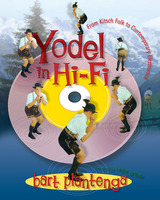
“If Wisconsin wasn’t on the yodel music map before, this book puts it there.”—Wisconsin State Journal
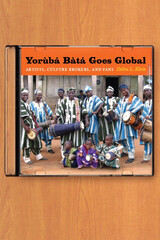
Yorùbá Bàtá Goes Global describes the dramatic changes and reinventions of traditional bàtá performance in recent years, showing how they are continually recreated, performed, and sold. Klein delves into the lives of Yorùbá musicians, focusing on their strategic collaborations with artists, culture brokers, researchers, and entrepreneurs worldwide. And she explores how reinvigorated performing ensembles are beginning to parlay success on the world stage into increased power and status within Nigeria. Klein’s study of the interwoven roles of innovation and tradition will interest scholars of African, global, and cultural studies, anthropology, and ethnomusicology alike.

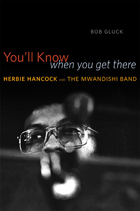
As the 1960s ended, Herbie Hancock embarked on a grand creative experiment. Having just been dismissed from the celebrated Miles Davis Quintet, he set out on the road, playing with his first touring group as a leader until he eventually formed what would become a revolutionary band. Taking the Swahili name Mwandishi, the group would go on to play some of the most innovative music of the 1970s, fusing an assortment of musical genres, American and African cultures, and acoustic and electronic sounds into groundbreaking experiments that helped shape the American popular music that followed. In You’ll Know When You Get There, Bob Gluck offers the first comprehensive study of this influential group, mapping the musical, technological, political, and cultural changes that they not only lived in but also effected.
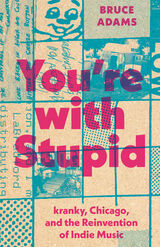
2023 ARSC Awards for Excellence in Historical Recorded Sound Research, Association for Recorded Sound Collections
An insider’s look at how Chicago’s underground music industry transformed indie rock in the 1990s.
In the 1990s, Chicago was at the center of indie rock, propelling bands like the Smashing Pumpkins and Liz Phair to the national stage. The musical ecosystem from which these bands emerged, though, was expansive and diverse. Grunge players comingled with the electronic, jazz, psychedelic, and ambient music communities, and an inventive, collaborative group of local labels—kranky, Drag City, and Thrill Jockey, among others—embraced the new, evolving sound of indie “rock.” Bruce Adams, co-founder of kranky records, was there to bear witness.
In You’re with Stupid, Adams offers an insider’s look at the role Chicago’s underground music industry played in the transformation of indie rock. Chicago labels, as Adams explains, used the attention brought by national acts to launch bands that drew on influences outside the Nirvana-inspired sound then dominating pop. The bands themselves—Labradford, Godspeed You! Black Emperor, Low—were not necessarily based in Chicago, but it was Chicago labels like kranky that had the ears and the infrastructure to do something with this new music. In this way, Chicago-shaped sounds reached the wider world, presaging the genre-blending music of the twenty-first century. From an author who helped create the scene and launched some of its best music, You’re with Stupid is a fascinating and entertaining read.
READERS
Browse our collection.
PUBLISHERS
See BiblioVault's publisher services.
STUDENT SERVICES
Files for college accessibility offices.
UChicago Accessibility Resources
home | accessibility | search | about | contact us
BiblioVault ® 2001 - 2024
The University of Chicago Press









